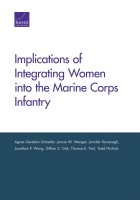| 来源类型 | Research Reports
|
| 规范类型 | 报告
|
| ISBN | 9780833092038
|
| 来源ID | RR-1103-USMC
|
| Implications of Integrating Women into the Marine Corps Infantry |
| Agnes Gereben Schaefer; Jennie W. Wenger; Jennifer Kavanagh; Jonathan P. Wong; Gillian S. Oak; Thomas E. Trail; Todd Nichols
|
| 发表日期 | 2015
|
| 出版年 | 2015
|
| 页码 | 214
|
| 语种 | 英语
|
| 结论 |
Research Indicates Gender Integration Has Not Been a Primary Cause of Cohesion Problems- In general, cohesion within gender-diverse groups improves over time.
- Cohesion should increase as women demonstrate the ability to perform at high levels.
- Negative impacts on cohesion can be prevented or mitigated by leadership and cohesion-building activities.
The Experiences of Foreign Militaries Provide Valuable Lessons- Recruiting and retaining women for combat arms occupations can be challenging.
- Successful integration programs have a clear implementation plan.
- Human resource management policies need to support integration: Targeted recruitment and retention policies can attract women into combat arms occupations and retain them in those occupations.
- Leadership commitment and accountability are vital to successful gender integration.
Civilian Fire and Police Departments Provide Useful Insights- Equipment and uniforms must meet the needs of women.
- Small-unit dynamics and discipline need to be closely monitored.
- Integration challenges change and mature over time.
There Will Be Both One-Time and Recurring Costs with Integration- The number of women entering the infantry will be modest, and the increase in representation will be slow.
- Women will have higher levels of attrition during training and fewer months of infantry service than men, but overall costs are expected to be modest compared to recruiting and retention budgets.
- The Marine Corps will be able to make up any shortfall in the infantry effectively through increased recruitment, increased retention, or both.
|
| 摘要 |
- Leadership is key to integration success. Senior leaders are uniquely positioned to implement and enforce legal and policy changes needed to support integration. Leaders also set the command climate and enforce good order and discipline to prevent issues of misconduct that can have negative impacts on cohesion.
- Develop a detailed implementation plan and assign accountability. An implementation plan ensures that integration occurs alongside the necessary training, mentorship, monitoring, and institutional support. It is also important to assign responsibility and accountability for the various elements of the implementation plan.
- Establish oversight mechanisms to build trust, transparency, and accountability. Oversight mechanisms should include both internal monitoring to help ensure consistent institutional commitment, and external monitoring to provide objectivity, transparency, and accountability.
- Monitor standards and training. It is critical to continue to develop validated gender-neutral standards, update those standards and training, and enforce standards equally.
- Plan for long-term career progression issues. Integration challenges related to recruiting, hiring, promotion, and retention change over time as women advance in their careers.
- Develop integration strategies that best suit the Marine Corps through experimentation linked to data collection, analysis, and evaluation. These data, analyses, and evaluations are the building-blocks for monitoring integration and can also help refine the implementation plan and associated policies.
- Monitor integration progress over time. A strong monitoring plan relies on robust data systems that facilitate the necessary data collection to measure integration progress.
- Manage internal and external expectations, and ensure the planning process for integration is flexible enough to accommodate learning and adjustments.
|
| 主题 | Gender Discrimination
; Gender Equity in the Workplace
; Military Personnel Retention
; Military Recruitment
; United States Marine Corps
; Workforce Diversity
; Workforce Management
|
| URL | https://www.rand.org/pubs/research_reports/RR1103.html
|
| 来源智库 | RAND Corporation (United States)
|
| 资源类型 | 智库出版物
|
| 条目标识符 | http://119.78.100.153/handle/2XGU8XDN/107976
|
推荐引用方式
GB/T 7714 |
Agnes Gereben Schaefer,Jennie W. Wenger,Jennifer Kavanagh,et al. Implications of Integrating Women into the Marine Corps Infantry. 2015.
|
|
文件名:
|
x1495316220648.jpg
|
|
格式:
|
JPEG
|

|
文件名:
|
RAND_RR1103.pdf
|
|
格式:
|
Adobe PDF
|
除非特别说明,本系统中所有内容都受版权保护,并保留所有权利。